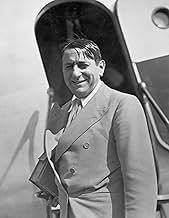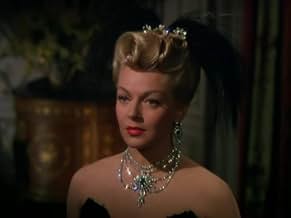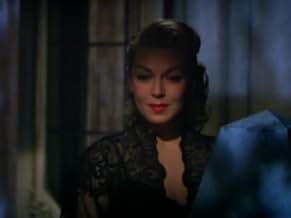VALUTAZIONE IMDb
5,7/10
701
LA TUA VALUTAZIONE
Aggiungi una trama nella tua linguaOperating under royal orders, a count must woo a young and wealthy widow in order to save a kingdom from bankruptcy.Operating under royal orders, a count must woo a young and wealthy widow in order to save a kingdom from bankruptcy.Operating under royal orders, a count must woo a young and wealthy widow in order to save a kingdom from bankruptcy.
- Regia
- Sceneggiatura
- Star
- Candidato a 2 Oscar
- 2 candidature totali
Sujata Rubener
- Gypsy Girl
- (as Sujata)
Ludwig Stössel
- Major Domo
- (as Ludwig Stossel)
John Alban
- Club Patron
- (non citato nei titoli originali)
Erville Alderson
- Cart Driver
- (non citato nei titoli originali)
Bette Arlen
- Girl at Maxim's
- (non citato nei titoli originali)
Frank Arnold
- Waiter
- (non citato nei titoli originali)
Gertrude Astor
- Reception Guest
- (non citato nei titoli originali)
Recensioni in evidenza
The fictional nation of Marshovia is facing bankruptcy. So, to try to improve their finances, they invite a widow (Lana Turner) to their nation in order to give her deceased husband a statue...and try to marry her off to the handsome Count Danillo (Fernando Lamas). When she learns of the scheme, the widow is naturally angry and leaves Marshovia...and the Count soon follows her to Paris. Can the scheme STILL work in spite of all this?
The 1934 version of "The Merry Widow" was a marvelous old film for several important reasons. The Franz Lehár operetta (based on Henri Meilhac's play) was given the special Ernst Lubitsch touch and it happened to star one of the most charming actors of its day, Maurice Chevalier. But, when MGM wanted to remake the film in 1952, it lacked this same marvelous direction and starred the handsome but much blander Fernando Lamas. Apart from the nice Technicolor, it really is inferior to the earlier version...though it still is watchable and pleasant...but nothing more.
The 1934 version of "The Merry Widow" was a marvelous old film for several important reasons. The Franz Lehár operetta (based on Henri Meilhac's play) was given the special Ernst Lubitsch touch and it happened to star one of the most charming actors of its day, Maurice Chevalier. But, when MGM wanted to remake the film in 1952, it lacked this same marvelous direction and starred the handsome but much blander Fernando Lamas. Apart from the nice Technicolor, it really is inferior to the earlier version...though it still is watchable and pleasant...but nothing more.
In Australia we are still able to see the beautiful MGM musical in a real 1952 vintage 3 strip Technicolor print which is still in very good condition. I saw it last year and apart from a few bumpy reel changes it is very clean and not scratched too much. Lucky us! I know this is not the definitive version purists rave about (that is the 1934 version) but MGM in 1952 was about as technically lush and state of the art perfect as one could want for any musical. In fact MW is is as colorful and as visually lavish as MY FAIR LADY or ON A CLEAR DAY or HALF A SIXPENCE or even the indoor scenes in TITANIC to any modern audience. The Gen x-ers who saw this version were absolutely in awe of how spectacular this REAL Technicolor version is. Lana is amazingly beautiful and Fernando is his virile Latin he man best. The Waltz in the last reel is exquisite. The only irritating bit is the same 'mid-west-Yanks-in-Europe' antics that annoy in LOVELY TO LOOK AT made the same year. However, who really cares when THE MERRY WIDOW is visually astonishing and musically delicious. What a year it was at MGM in 1952! And this much guarded and treasured proper Hollywood 3 strip Technicolor print is staying here, folks! If you wanna see it you have to come visit.
The one thing I like about this movie is that Lana Turner got a chance to do something that she normally wouldn't do; be in a musical. O.K., so she couldn't sing and the one song that she did sing was dubbed by Trudy Erwin who dubbed Kim Novak in Pal Joey! Big deal! So, all of the singing numbers went to Fernando Lamas who "could" sing, and he does them very well, but this film has a lot more going for it than what one would think. First of all, it's not as stuffy as the Jeanette McDonald version in which she is to fall in love with Maurice Chevalier and why would a beauty like Jeanett want to fall in love with Maurice? At least we have the beautiful Lana falling in love with the very handsome Fernado which they did when making this movie together and it shows. What doesn't show through the movie is Lana's wrists which were bandaged because of a suicide attempt. The Merry Widow Ballet at the end of the movie is just down-right glorious. The cast looks like they're having the time of their life including Una Merkel who didn't look like it in the Jeanette McDonald version in which she played the same role! In fact, in this version, the credits and one scene on the balcony makes you ask, "Is Una's name Kitty or Katie? When Lana enters Maximes, we see Gwen Verdon doing the Can Can and at that time she wasn't really that well known except for her dance number with Betty Grable "I Feel Like Dancing Tonight" is Meet Me After the Show! But, Lana Turner never looked more beautiful, Fernando Lamas was just terrific as Count Denilo, and you couldn't help wondering where you heard Richard Haydens voice until you saw Disney's Alice In Wonderland in which he spoke for the Catipillar! And, of course, years later, we would recognize him as Uncle Max in the movie version of "The Sound of Music", and even though it's trivia now, we have Fernando Lamas' impersonating Richard Hayden, and very well, saying, "It's your little Fifi" which is right in there with the trivia question "What did Klatu tell Patricia Neal to tell Gort is anything happened to him!. Klatu Barada Nico". So, all in all, the music is great, the performances are high camp at its best, and that great Ballet at the end, leading into Lana Turner asking Charles Gomez, "What did your Excellency exactly mean - heads will roll?" and that glorious Technicolor makes this great entertainment, but - again, I have to say that these movies were meant for the large movie theater screen, and without that screen you can not even imagine how wonderful this movie and other were in those days! That large screen "did" make the difference!
This 1952 MGM production of Franz Lehar's classic pales in comparison with the Erns Lubitsch's lavish version, that even in black and white, is richer and more appealing to the eye than the later account.
Part of the blame must go to whoever decided to tailor make the film to suit its star, Lana Turner, and the direction of Curtis Bernhardt. As an operetta "The Merry Widow" has been delighting audiences for quite some time. The music alone is worth the price of admission, or in this case, the price of being able to get TCM on cable.
The other interesting thing is how the Technicolor used in the filming of this remake has faded after more than fifty years. The copy shown by TCM recently had a faded look that made it less interesting to watch.
Lana Turner and Fernando Lamas made an attractive couple, but their chemistry doesn't quite make it. Veterans Una Merkel, Thomas Gomez, Richard Haydn, and Marcel Dalio, among others, try their best, but their efforts don't make the film better.
We would strongly advise discerning viewers to check out the older Lubitsch's take on this timeless work.
Part of the blame must go to whoever decided to tailor make the film to suit its star, Lana Turner, and the direction of Curtis Bernhardt. As an operetta "The Merry Widow" has been delighting audiences for quite some time. The music alone is worth the price of admission, or in this case, the price of being able to get TCM on cable.
The other interesting thing is how the Technicolor used in the filming of this remake has faded after more than fifty years. The copy shown by TCM recently had a faded look that made it less interesting to watch.
Lana Turner and Fernando Lamas made an attractive couple, but their chemistry doesn't quite make it. Veterans Una Merkel, Thomas Gomez, Richard Haydn, and Marcel Dalio, among others, try their best, but their efforts don't make the film better.
We would strongly advise discerning viewers to check out the older Lubitsch's take on this timeless work.
My wife and I met doing a professional production of "The Merry Widow" in 1982 -- in English, but a straight translation.
Only the very basic skeleton of the original plot is visible in this "adaptation". Most of the characters have been deleted, along with the entire B plot, and all but one of the characters remaining have been renamed. Most of the characters in the movie aren't in the operetta, either. The action has been moved from Paris to, at first, Washington, DC, and then to the fictional country of Pontevedro, which the movie has renamed "Marshovia", and only later to Paris. The net result is that we don't reach the beginning of the original play until about 45 minutes in.
And the main source of tension in the plot is deleted, too. In the original, years before, Count Danilo and the heroine were very much in love, but his family refused to allow them to marry because she was poor; it's his broken heart that has rendered him a careless playboy. Now that, as a widow, she's the richest woman in the world, she still loves him, and he still loves her, but his pride won't let him admit it to anyone, even himself, and she must spend three acts playing mind games to break him down. The trope of the aristocrat with money problems who won't admit that he's in love with a rich woman for fear of what people will think supplied the main plots of a substantial fraction of Viennese operettas for decades after the 1906 "Widow". In this movie, they've never met before, which rips out not only the heart of the whole thing, but nearly all the comedy.
Lamas does a pretty decent job, though.
An interesting musical point is that several times we hear a snippet or so of "Trés Parisien", an extra song written (in English, despite the title) for the London première, which was not, as far as I know, usually found in American productions until the 1980s or so.
Only the very basic skeleton of the original plot is visible in this "adaptation". Most of the characters have been deleted, along with the entire B plot, and all but one of the characters remaining have been renamed. Most of the characters in the movie aren't in the operetta, either. The action has been moved from Paris to, at first, Washington, DC, and then to the fictional country of Pontevedro, which the movie has renamed "Marshovia", and only later to Paris. The net result is that we don't reach the beginning of the original play until about 45 minutes in.
And the main source of tension in the plot is deleted, too. In the original, years before, Count Danilo and the heroine were very much in love, but his family refused to allow them to marry because she was poor; it's his broken heart that has rendered him a careless playboy. Now that, as a widow, she's the richest woman in the world, she still loves him, and he still loves her, but his pride won't let him admit it to anyone, even himself, and she must spend three acts playing mind games to break him down. The trope of the aristocrat with money problems who won't admit that he's in love with a rich woman for fear of what people will think supplied the main plots of a substantial fraction of Viennese operettas for decades after the 1906 "Widow". In this movie, they've never met before, which rips out not only the heart of the whole thing, but nearly all the comedy.
Lamas does a pretty decent job, though.
An interesting musical point is that several times we hear a snippet or so of "Trés Parisien", an extra song written (in English, despite the title) for the London première, which was not, as far as I know, usually found in American productions until the 1980s or so.
Lo sapevi?
- QuizAfter Lana Turner's millionaire husband Bob Topping left her in 1951, she slashed her wrist and had to wear a bracelet during this shoot to cover the scar.
- BlooperThe statement about beginnings of decades and centuries, is absolutely not correct. :-)
- Citazioni
King of Marshovia: I'm not asking you to fall in love with the woman. Marriage is quite enough.
- ConnessioniFeatured in Hollywood Hollywood (1976)
- Colonne sonoreGirls, Girls, Girls
(uncredited)
Music by Franz Lehár
Lyrics by Paul Francis Webster
Sung by Fernando Lamas
I più visti
Accedi per valutare e creare un elenco di titoli salvati per ottenere consigli personalizzati
- How long is The Merry Widow?Powered by Alexa
Dettagli
Botteghino
- Lordo Stati Uniti e Canada
- 4.865.760 USD
- Lordo in tutto il mondo
- 9.810.000 USD
- Tempo di esecuzione
- 1h 45min(105 min)
- Proporzioni
- 1.37 : 1
Contribuisci a questa pagina
Suggerisci una modifica o aggiungi i contenuti mancanti



































